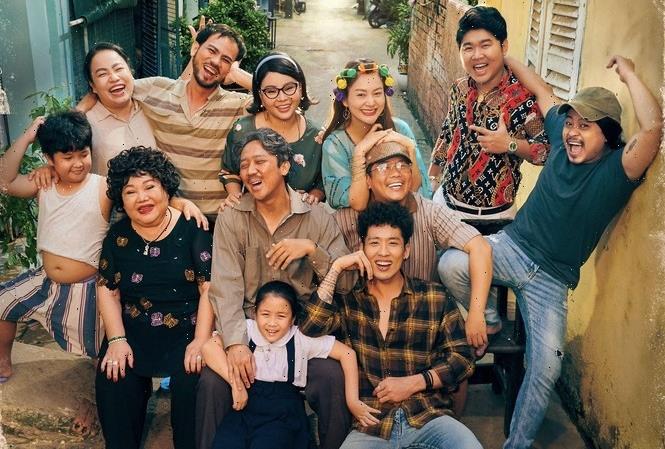How many Vietnamese films have you ever seen? Or even heard of? For a heavily populated country that was controlled during roughly the first half of the 20th century by one of the most cinematically advanced nations, France, it’s surprising that Vietnam has such a thin history where film is concerned. The only Vietnamese director to ever make much of mark internationally is Tran Anh Hung, who in the 1990s gained an art house reputation with such films as The Scent Of Green Papaya and Cyclo.

But now suddenly a new film has opened in the United States (via 3388 Films) that is being promoted as the number one Vietnamese box office champion of all time. On a budget of $1M, Dad, I’m Sorry (Bo Gia) has raked in over $17M in its native country since releasing on March 12. And, after two weekends dominating the U.S. specialty box office, it has now grossed $820K. The film played at 19 theaters in its first week, growing that to 38 in the second week and will expand to 45 this weekend.
The story originated in Vietnam as a five-episode web drama that drew some 90 million viewers and was the brainchild of Tran Thanh, a hugely popular comic actor and television host. Tran wrote the piece, co-directed with Vu Ngoc Dang, and also stars as a beleaguered middle-aged man who tries, and largely fails, to preside over a dysfunctional, exceptionally argumentative family in a poor area of Saigon, a city now marked by any number of skyscrapers. This is a disputatious comedy-drama with a thick sentimental streak.
If Tran rates a comparison to any American comedian, it might be to Rodney Dangerfield, not at all physically or in style, but by virtue of the fact that his character, named Ba Sang, is overwhelmingly beleaguered and bubbling over with complaints. Living with uncountable relations — whether they actually live there or not seems a moot point, as they’re always around — in a slum called the Alley that’s always brimming with activity, the ineffectual Ba is constantly on the receiving end of criticisms from his various relations, none of whom appears to be contributing much themselves.
The level of comedy served up is sitcom in spades — or maybe just in jokers: A little boy is always running around with his pants falling down and butt-crack showing; pixilated action is hectically sped up and slowed down to capture characters at their most awkward and gross; one woman never takes the blindingly bright plastic curlers out of her hair; a little girl complains that “rice is boring;” Ba’s over-fed sister is nasty to everyone, while his brother is an errant drunken a-hole who can be counted upon to disrupt everything. Worst of all is that Ba owes money to local mobsters, who stop by to begin cutting off his fingers if he doesn’t start repaying his debt. All of this discord is back-grounded by the most miserably manipulative laugh-track-style musical score you can imagine; every joke is punctuated by a silly, emphatic musical outburst.
For a fleeting moment, it appears that Dad might be positioning to become a modern version of the “neighborhood” or “street” French films of the 1930s, where the ups and downs of the inhabitants are everyone’s business. No such luck. The characters’ main concerns are material when they aren’t complaining or vituperative; exasperation is the dominant sentiment.
Ba’s problem is that he’s a chronic meddler, and his interference invariably makes things worse; emotional rifts run through the family in every conceivable direction. This is particularly true when it comes to Ba Sang and his tall, lanky, YouTuber son Woan (Tuan Tran), who fancies himself a trendy hipster with a showbiz future when, in fact, he’s got an illegitimate kid to deal with.
It’s possible that one key to Dad’s big local success is that it confirms that, no matter what problems you’ve got, someone else has it much worse than you do. The extreme predicaments that the family members confront get pretty gnarly and probably do outweigh what most people have to contend with in real life — or at least they’re exaggerated here in way a that makes them seem notably onerous. The tonal change the film undergoes in the second half is quite severe — the kind of family shortcomings that can be laughed at in the early-going are nothing compared to the pretty dreadful circumstances that eventually ensnare the family members.
After the gross comedy of the first act, one is in no way prepared to expect a climax that includes illegitimate offspring, treacherously high blood pressure, dialysis, hemophilia, a pacemaker and a needed kidney transplant from a family donor. “My family is a mess,” Ba confesses, and he’s not kidding. The film’s moral would seem to be, Love is never having to say you’re sorry, even when your whole family would do well to profusely apologize for belligerently blundering from one crisis to the next.
International Critics Line
Int’l Critics Line: Anna Smith On ‘Tove’, Biopic Of Unconventional Moomins Creator
Int’l Critics Line: Todd McCarthy On Mads Mikkelsen-Starrer ‘Riders Of Justice’
Int’l Critics Line: Anna Smith On Suzanne Lindon’s Whimsical Romance ‘Spring Blossom’
Read More About:
Source: Read Full Article
